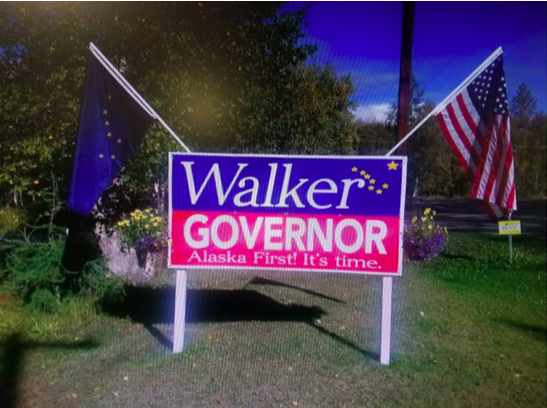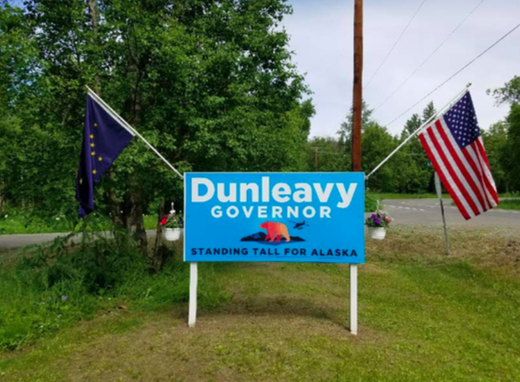ALASKAN SAYS STATE IS SUPPRESSING POLITICAL SPEECH
The American Civil Liberties Union of Alaska and the group that calls itself “Dunleavy for Alaska,” joined with Alaska resident Eric Siebels to file a lawsuit against the State of Alaska over political signs.
The lawsuit seeks to immediately block enforcement of a state statute barring political signs near roadways and asks for those rules to be struck down as unconstitutional.
Siebels is a longtime Alaska resident who, in 2014, constructed a 4’ x 8’ sign on his property in Palmer, advocating for the candidacy of Gov. Bill Walker. The sign had flower baskets and flags on it and was visible from the roadway.
The State never objected to the sign, even though Gov. Sean Parnell was in office, and Walker was challenging him.

In 2018, Siebels requested a sign from the Dunleavy for Alaska group and installed it in the exact same place, with flower pots and flags on it.
In July, Siebels learned that the Department of Transportation had announced a crackdown on political signs near roadways, and that citizens would be facing fines and criminal sanctions if their political signs were visible from a roadway. Coincidentally, Siebels is a state employee who works for DOT at the Ted Stevens International Airport, where he is a maintenance foreman.
In August, Siebels saw DOT had done as promised, and had flagged political signs in his community, including ones near his property.
Siebels also observed that DOT’s crackdown was exclusively focused on political speech, and omitted any enforcement of other kinds of signs.
As an example, Mr. Siebels observed that all political signs along a roadway in Palmer had been flagged by DOT with survey tape, whereas an adjacent sign advertising that vegetables were for sale one mile away was not flagged.

Alaska Statute 19.25.105 prohibits outdoor advertising on or within 660 feet of state rights-of-way for interstate, primary, and secondary highways within Alaska.
The complainants say this statute effectively prohibits thousands of Alaskans from displaying political speech anywhere on their own property.
On. July 10, the Alaska Department of Transportation sent a notice to Dunleavy for Alaska threatening financial and criminal sanctions for posting political signs within the view of certain roadways.
DOT told media outlets that it was part of a planned sweep of signs near roadways.
By its own admission, the Department of Transportation did not remove any of Gov. Bill Walker’s campaign signs. The order to remove the signs came after the Walker campaign purchased a large order of Anchorage bus wrap signs for the Walker campaign, tying up alternative outdoor advertising.
DOT spokeswoman Shannon McCarthy said that of the 200 to 250 political signs tagged for removal in Anchorage as part of this sweep, only about 50 posed immediate safety concerns. Her statement made it clear the overwhelming majority of the removed signs posed little or no risk to the public.
“There is no right more fundamental to a democracy than the right of an individual to express their personal political views,” said ACLU of Alaska Executive Director Joshua A. Decker, in a news release. “That is why the U.S. Supreme Court has afforded political speech special protection. If the government wants to seize that right by barring Alaskans from displaying political signs on their own property, they need a more compelling reason than because somebody might see it.”
“We have been blown away by Alaskans’ passionate response to our signs. Everyone seems to want one,” said Dunleavy for Alaska Chairman Terre Gales. “We have taken a lot of pride in designing colorful and attractive signs that Alaskans will enjoy. For the state to step in and say you can’t put up that sign because it says ‘Dunleavy’ but can keep the sign next to it that says ‘Veggies for sale’ just seems arbitrary. It makes you wonder why it is really being done.”
The Dunleavy for Alaska group has spent over $50,000 on signs, and that expenditure is known by the Gov. Bill Walker campaign, as they can check the financial records to see what the investment is.
According to the Dunleavy for Alaska group, the signs are in high demand, with over 100 requests for them in the past week alone:

The group says it has distributed at least 1,000 yard signs to Alaska voters in over 100 different communities statewide.
The group says it’s given directions to its volunteers and sign vendor to install signs only on private property, and only with the property owner’s consent.
Since the crackdown began, DOT has flagged and confiscated several Dunleavy for Alaska signs.
On Aug. 10, the group contacted DOT to recover its signs, but was told to come back on Aug. 13. Then, the state agency said that the group would have to pay $200 per sign to recover them. DOT prohibited the group’s representatives from entering the “sign graveyard” area where the signs were stored to count how many signs had been confiscated.
One of the exhibits the complainants are using is a photo from the Anchorage Daily News, which shows the sign graveyard and that only political speech signs have been targeted by the State.

Read the complaint here:
Complaint for Injunctive and Declaratory Relief for the Vindication of Constutitional Rights
